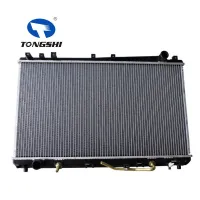How much does it cost to replace a radiator?
The radiator, a critical component of your vehicle's cooling system, plays a pivotal role in maintaining optimal engine temperature. Over time, radiators can wear out or develop leaks, necessitating replacement. Understanding the factors influencing the cost of radiator replacement and exploring available options will empower you to make informed decisions regarding your vehicle's maintenance.
**1. Radiator Replacement Basics:
What Does a Radiator Do?
The car radiator is responsible for dissipating heat generated by the engine. Coolant circulates through the engine, absorbing heat, and then flows through the radiator, where it releases heat to the air, ensuring the engine stays within the optimal temperature range.
Signs Your Radiator Needs Replacement:
Common indicators include coolant leaks, overheating, visible damage, or a significant drop in coolant levels. If you notice any of these signs, it's crucial to address the issue promptly to prevent engine damage.
**2. Factors Influencing Costs:
Vehicle Make and Model:
The type of vehicle you own significantly influences the cost of radiator replacement. High-end or luxury vehicles may have more expensive parts, impacting the overall expense.
New vs. Refurbished Radiators:
Opting for a new radiator or a refurbished one affects costs. New radiators generally come with higher price tags but offer reliability and a manufacturer's warranty. Refurbished radiators may be more budget-friendly but may lack the same longevity and warranty coverage.
Labor Costs:
Labor charges contribute substantially to the total cost. Labor rates vary by location and the mechanic's expertise. A radiator replacement typically involves draining coolant, removing the old radiator, installing the new one, and refilling the coolant.
Additional Parts:
Depending on the condition of your vehicle and the specifics of the replacement, additional parts such as hoses, clamps, and coolant may be needed. These items add to the overall cost.
OEM vs. Aftermarket Parts:
Choosing original equipment manufacturer (OEM) parts or aftermarket alternatives affects the cost. OEM parts are specifically designed for your vehicle but tend to be pricier. Aftermarket parts are more budget-friendly but may vary in quality.
**3. DIY vs. Professional Replacement:
DIY Replacement:
If you have mechanical skills, replacing a radiator yourself can save on labor costs. However, it requires access to the right tools, a suitable workspace, and confidence in your ability to perform the task accurately.
Professional Replacement:
Opting for professional installation ensures that the replacement is done correctly. Professional mechanics have the expertise to address potential issues during the replacement process, providing peace of mind.

**4. Estimating Costs:
Radiator Costs:
The price of a radiator ranges widely based on factors like the vehicle's make and model, whether it's new or refurbished, and the brand. Radiator prices can start from around $100 and go up to $500 or more for certain high-performance or luxury vehicles.
Labor Costs:
Labor charges vary by location and the shop's hourly rates. On average, labor costs for radiator replacement range from $300 to $800 or more. The complexity of the replacement job influences the total labor time.
Additional Parts:
Budgeting for additional parts, such as hoses, clamps, and coolant, is essential. These can contribute an extra $50 to $100 or more to the total cost.
Total Estimate:
Combining the cost of the radiator, labor charges, and additional parts, a total estimate for professional radiator replacement can range from $500 to $1,500 or more. This estimate provides a general overview, and actual costs may vary based on specific circumstances.
**5. Getting Quotes and Comparing Options:
Multiple Quotes:
To get an accurate estimate for your specific vehicle and location, obtain quotes from multiple mechanics or automotive service centers. This allows you to compare prices and services.
Consideration of Options:
When receiving quotes, inquire about the type of radiator offered, whether OEM or aftermarket, and the warranty coverage. Understanding these details will help you make an informed decision based on both cost and quality.
**6. Conclusion:
Understanding the cost of radiator replacement involves considering various factors, from the type of vehicle you own to the labor rates in your location. Whether you choose a professional installation or opt for a DIY approach, it's essential to weigh the costs against the benefits of ensuring your vehicle's continued reliability and performance. By taking a proactive approach to radiator maintenance, you not only safeguard your engine but also contribute to the overall longevity and efficiency of your vehicle.
68
0
0

Comments
All Comments (0)